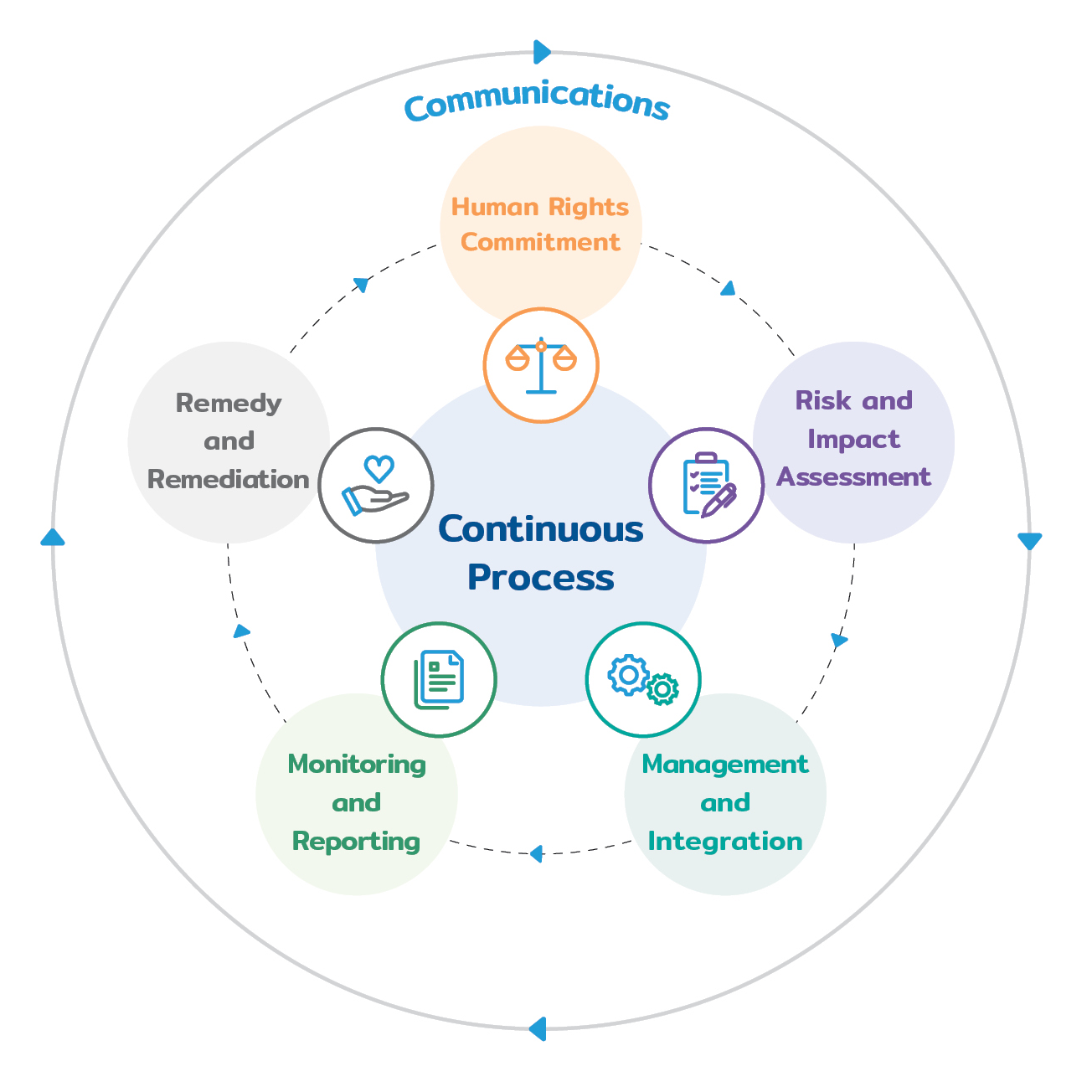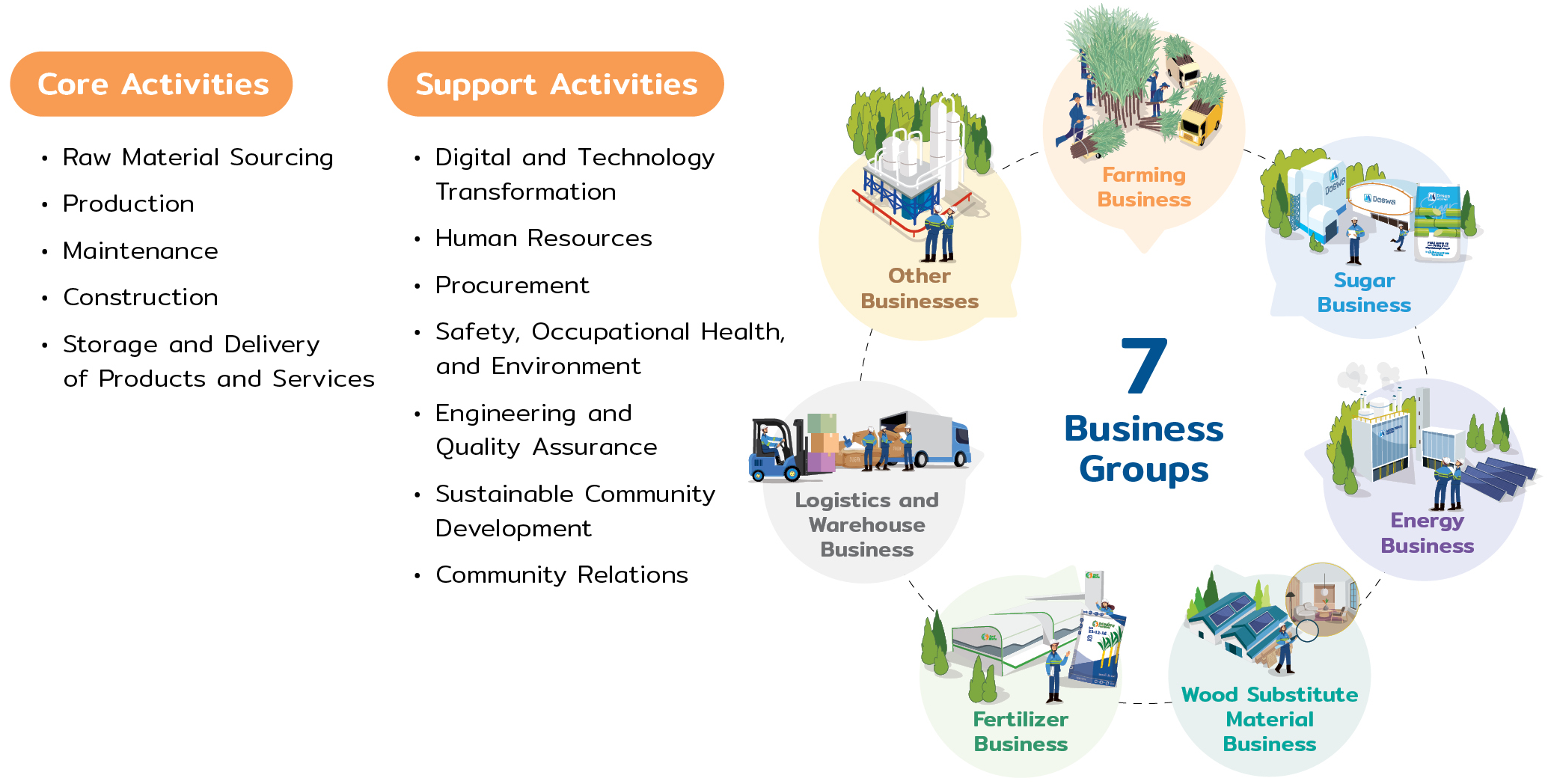| Salient Human Rights Issues | Operational Measures |
| Labor |
| 1. Occupational Health and Safety | - Establish a safety policy such as standard operating procedures, and the use of tools and equipment.
- Implement life-saving rules based on the specific risks of each business unit, conduct organization-wide safety assessments, and engage each factory in accordance with the SSHE framework.
- Cultivate a safety culture in the organization.
- Provide training on work safety and on working in risky areas for employees, farmers, and contractors.
- Prepare personal protective equipment (PPE) for employees and equipment standards are set for contractors.
- Implement a Behavior-Based Safety Program and report any unsafe conditions for corrective action.
- Register pregnant employees annually to track the number of pregnancies and to ensure appropriate job placements that better suit their physical condition during pregnancy.
- Organize health promotion activities, such as Losing Belly Fat and Live a Healthier Life.
- Achieve the ISO 45001:2018 Occupational Health and Safety Management System certification.
|
| 2. Unclear Employment Conditions in the Supply Chain | - Establish a Manual of Practices for human resources and contracted labor.
- Ensure written acknowledgment of the Code of Conduct both by all employees and suppliers.
- Implement an assessment process and conduct random inspections of supplier operations.
- Communicate with suppliers and raise their awareness about labor laws and human rights policies.
- Establish an explicit complaint-handling process.
|
| 3. Care for Children in the Workplace | - Allocate safe rest areas for farmers, their followers, and contractors.
- Establish protocols for controlling and inspecting entrances and exits at all factories across every business unit.
- Provide farmers with knowledge and understanding and establish an inspection process for sugarcane plantations.
- Set up childcare centers in the area of sugar mills and the Panel Plus.
|
| Community Rights and Environment |
| 4. Safety and Livelihoods of People in the Community | - Clear procedures for conducting community surveys and handling complaints.
- A tripartite environmental management process to facilitate joint deliberation among factories, communities, and government agencies or governance networks.
- Establish a dedicated unit responsible for communication, oversight, and engagement in sustainable community development.
- Launch a sugarcane leaf-buying project to reduce sugarcane-burning practices and boost farmers' income.
- Set a Net Zero Goal to address and mitigate the impacts of climate change.
|
| 5. Waste Management and Pollution Control | - Establish a Security, Safety, Occupational Health, and Environment policy, Green Procurement policy, and a policy to hire authorized suppliers to remove unwanted materials from factories for disposal according to the regulations of the Department of Industrial Works.
- Establish a monitoring and control system in alignment with key environmental indicators.
- Initiate the project to develop the AERMODEL and IoT sensor system, leveraging digital technology to create a weather and pollution forecasting program. This initiative enables real-time information dissemination, alerts, and automated control within the Company’s pollution management system.
- Utilize the AERMODEL system, an air pollution forecasting tool, to analyze air quality using meteorological data and smokestack emissions. This system supports environmental management in the wood substitute material business.
- Implement a plan for regular environmental quality assessments inside and outside factory premises, including installing Continuous Emission Monitoring Systems (CEMs).
- Implement the Waste-to-Value project to explore and manage waste recycling opportunities, such as researching and repurposing ash from power plants.
- Achieve ISO 14001:2015 Environmental Management Systems certification.
|
| 6. Water Management in Business Operations | - Establish wastewater treatment systems and systems to control the odor and improve air quality.
- Implement a zero-discharge project by reusing treated water in Mitr Phol’s farming operations.
|
| Customer and Consumer Rights |
| 7. Health and Safety for Consumers of Sugar Products | - Supervise and ensure food quality and safety in line with international standards such as ISO 9000, ISO 22000, FSSC 22000, GMP, and HACCP throughout the supply chain to maintain consumer trust in the quality and safety of the Company’s food products.
- Inspect contaminants in products and control the use of herbicides and heavy metals to ensure compliance with specified standards.
- Utilize industrial technology in production and packaging to meet international standards for Good Hygiene Practices (GHP) for food production (GHP) and Food Safety System Certification 22000 (FSSC 22000).
- Regularly survey customer and consumer satisfaction and incorporate feedback to continuously improve the quality of products and services to maintain customer satisfaction.
- Establish the process and channels for receiving complaints and suggestions about products or services, ensuring prompt complaint handling to enhance customer satisfaction.
|


